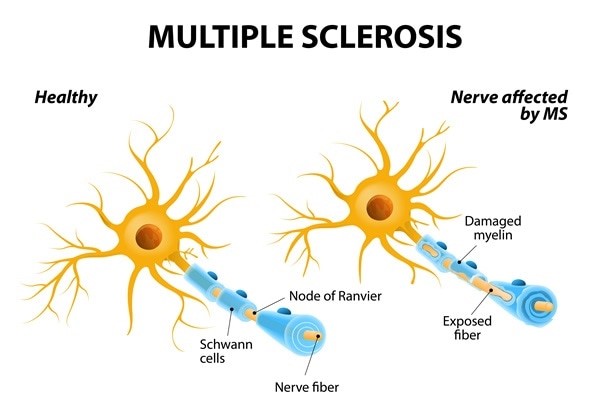The nurse provides education to a client who is newly diagnosed with multiple sclerosis (MS). Which client statements indicate the need for additional teaching? SELECT ALL THAT APPLY
"I may experience urinary incontinence."
"I should not exercise because this may trigger an exacerbation."
"I should alternate the eye patch every other day to help with the double vision."
"I may experience visual disturbances."
"I need to check the water temperature before I take a bath."
Correct Answer : B,C
Choice A reason: "I may experience urinary incontinence." This statement does not indicate the need for additional teaching. It is a correct statement that reflects an understanding of one of the possible symptoms of MS. Urinary incontinence is caused by nerve damage that affects bladder control.
Choice B reason: "I should not exercise because this may trigger an exacerbation." This statement indicates the need for additional teaching. It is an incorrect statement that reflects a misconception about exercise and MS. Exercise does not cause or worsen MS relapses but rather has many benefits for people with MS, such as improving muscle strength, balance, mobility, mood, and quality of life.
Choice C reason: "I should alternate the eye patch every other day to help with the double vision." This statement indicates the need for additional teaching. It is an incorrect statement that reflects a misunderstanding of how to manage double vision, which is another possible symptom of MS. Alternating the eye patch every other day does not help with double vision, but rather may cause eye fatigue or confusion. The correct way to use an eye patch is to wear it on one eye only when needed, such as when reading or driving.
Choice D reason: "I may experience visual disturbances." This statement does not indicate the need for additional teaching. It is a correct statement that reflects an awareness of another possible symptom of MS. Visual disturbances may include blurred vision, loss of color vision, pain in one eye, or partial or complete blindness.
Choice E reason: "I need to check the water temperature before I take a bath." This statement does not indicate the need for additional teaching. It is a correct statement that reflects a precaution that people with MS should take. Checking the water temperature before taking a bath can prevent burns or scalds, as some people with MS may have reduced sensation or numbness in their skin.

Nursing Test Bank
Naxlex Comprehensive Predictor Exams
Related Questions
Correct Answer is D
Explanation
Choice A reason: The AP's ability to complete the task without assistance is not one of the five rights of delegation. The nurse is responsible for providing adequate supervision and guidance to the AP, and ensuring that the task is done correctly and safely.
Choice B reason: The AP's ability to prioritize is not one of the five rights of delegation. The nurse is responsible for assigning tasks based on their urgency and importance and communicating clear expectations and deadlines to the AP.
Choice C reason: The AP's rapport with clients is not one of the five rights of delegation. The nurse is responsible for maintaining a therapeutic relationship with clients and respecting their preferences and needs.
Choice D reason: The AP has the knowledge and skill to perform the task is one of the five rights of delegation. The nurse is responsible for assessing the AP's competence and readiness to perform the task, and providing appropriate training and feedback if needed.

Correct Answer is C
Explanation
Choice A reason: Delivering a urine specimen to the laboratory is not a priority task, as it does not affect the client's immediate health or safety. This task can be done later or delegated to another staff member.
Choice B reason: Feeding a client who has bilateral casts is an important task, as it helps the client meet their nutritional needs and prevents complications such as pressure ulcers. However, this task is not as urgent as monitoring blood glucose levels, as it can be done within a reasonable time frame without causing harm to the client.
Choice C reason: Performing blood glucose monitoring of a client who has a prescription for short-acting insulin is a priority task, as it determines the dosage of insulin that the client needs to receive. Insulin is a high-alert medication that can cause serious adverse effects if given incorrectly. Therefore, this task should be done first by the AP who has been trained and certified to do so.
Choice D reason: Obtaining an extra box of tissues for a client who is concerned about running out of them is a low-priority task, as it does not affect the client's physical or psychological well-being. This task can be done at any time or delegated to another staff member.
Whether you are a student looking to ace your exams or a practicing nurse seeking to enhance your expertise , our nursing education contents will empower you with the confidence and competence to make a difference in the lives of patients and become a respected leader in the healthcare field.
Visit Naxlex, invest in your future and unlock endless possibilities with our unparalleled nursing education contents today
Report Wrong Answer on the Current Question
Do you disagree with the answer? If yes, what is your expected answer? Explain.
Kindly be descriptive with the issue you are facing.
